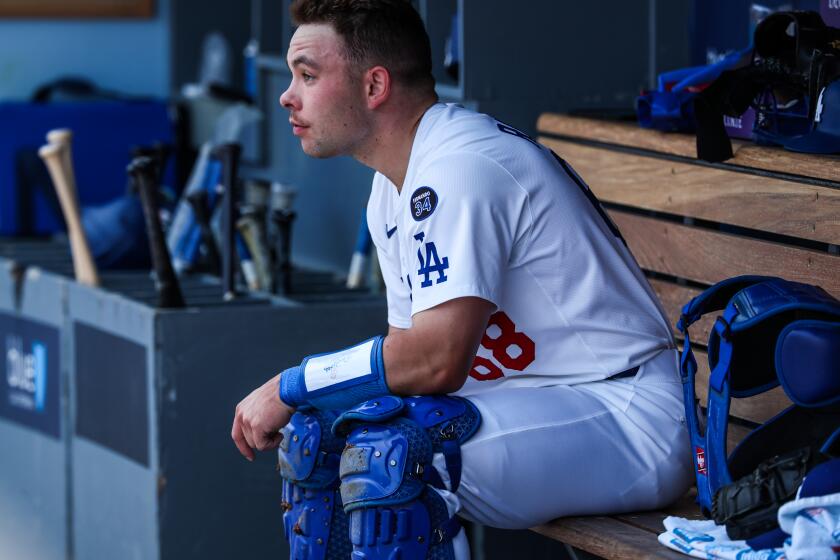Dalton Rushing keeps a few baseball gloves on the top shelf of his corner locker in the Dodger Stadium clubhouse. None of them is a catcher’s mitt.
Which seems significant since Rushing is a catcher.
But in college at Louisville and in the Cape Cod Summer League, he played more games at first base and in the outfield than behind the plate. So he still runs out with a fielder’s glove during batting practice, just in case.
Advertisement
“I’ll shag during BP, just kind of to take the shakiness, just to be as comfortable as possible if I have to go out there,” he said.
Read more: Clayton Kershaw and rebounding offense help Dodgers salvage split against Rockies
“It’s good to have that skill, to bounce over there and play. But the biggest thing moving forward is catching.”
Using Rushing as anything other than Will Smith’s backup behind the plate would qualify as a “break glass in case of emergency move” for manager Dave Roberts, although he has played Rushing for 13 innings at first base and tabbed him as the next man up when he feared Freddie Freeman would miss time after being hit on the left wrist last month.
Advertisement
“He can handle first base,” Roberts said. “I don’t feel good with him in left field, but he’s done it.
“Right now the main thing is to spell Will; continue to be good behind the plate.”
Few teams cherish utility more than the Dodgers, who have used five players in at least three different positions this season. However, catchers — even backup catchers — are typically valued more for their unique skills at calling games, blocking 100-mph pitches in the dirt and throwing out would-be base stealers than for their versatility.
That’s why Smith, the Dodgers’ starting catcher and a three-time National League All-Star, has played just 3 2/3 innings anywhere else in the field in seven major league seasons. Rushing expects the same.
Advertisement
“The main focus is catching. It’s been catching since I showed up,” he said. “When they made the decision to bring me up in May, it was kind of: ‘Hey, we want this guy to catch. Learn the position. Learn these guys as much as possible.’
“I like to keep it in my back pocket that I can play other positions. But I would say the main reason is still to catch.”
And hit, since the Dodgers also see value in Rushing’s bat. A left-handed hitter with pop, Rushing was slashing .308/.424/.514 when he was called up from triple-A Oklahoma City in May.
“The bat got him here,” Roberts said. “The performance got him here.”
Advertisement
How long it keeps him here is uncertain. Rushing, who has always been a starter, is having trouble adjusting to limited at-bats, hitting .186 with more than twice as many strikeouts as hits in 37 games.
But then this isn’t the first time he’s followed Smith since both catchers played college baseball at Louisville and in Cape Cod League. Smith, 30, who was born in Louisville, was undrafted out of high school but became a first-round pick of the Dodgers three years later, signing for a $1.775-million bonus. He made his big league debut in 2019, the same year Rushing graduated high school.
Read more: Rocky, and painful, outing for Shohei Ohtani as Dodgers lose to Colorado
Rushing, 24, from Tennessee, was a second-round pick in 2022, getting just under $2 million to sign with the Dodgers.
Advertisement
“He’s older than me by a few years, but we crossed paths a good bit,” said Rushing, who shares an agent with Smith. “It’s similar paths. That’s kind of what just allows the Dodgers to know what they’re getting.
“He helps out a lot, and it makes my job a lot easier. Seeing him do what he does every day and kind of just running things off of each other and just trying to learn as much as possible.”
It some ways, then, Rushing finds himself in the perfect position. No matter which glove he uses.
Sign up for more Dodgers news with Dodgers Dugout. Delivered at the start of each series.
This story originally appeared in Los Angeles Times.
